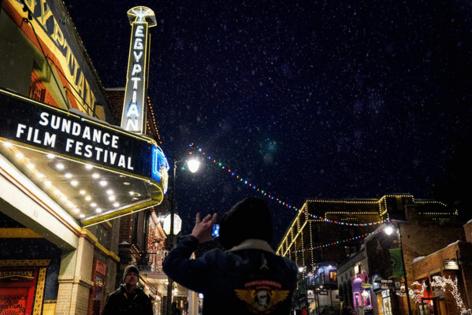Michael Phillips: Will Sundance Institute x Chicago be good for the local film industry?
Published in Entertainment News
CHICAGO — There’ll be more than one story to write about Sundance Institute x Chicago 2024, coming to town June 28-30. A sort of pop-up import, sponsored by the Chicago Film Office and city tourism bureau Choose Chicago, Sundance Institute x Chicago is the power of branding incarnate. The event will consist of a modest four-screening package of titles that premiered in January at the annual Sundance Film Festival of Park City, Utah, fame.
The off-screen activity is apparently the bigger deal: panels, discussions and filmmaker-centric meetups, patterned after the Sundance Institute’s programs designed to develop new work. Chicago’s late-March announcement included a mayoral endorsement, citing the three-day Sundance-branded event as a “momentous occasion for our city,” providing “an unparalleled platform for our local talent to engage with industry leaders and decision-makers.”
Good news, right? Well, it depends who’s being asked that question.
Over the years Sundance has puts its name on various “best of” spinoff events, including mini-festivals in Mexico City and London. From one angle, this June’s Chicago event moves Chicago to “the center of independent film, independent storytelling, and independent film exhibition,” as Chicago Film Office deputy commissioner Jonah Zeiger wrote on LinkedIn earlier this spring.
Zeiger elaborated last week in a phone interview, characterizing Chicago as a “talent magnet and a talent incubator” that “doesn’t get the recognition it deserves.” Details on the late June Sundance initiative, he said, will be announced in late May. The idea, Zeiger said, came out of his initial discussions last year with Sundance officials to host the Sundance Labs developmental program.
Sundance Institute x Chicago, he said, could “put Chicago at the center of the national conversation,” engaging “audiences and filmmakers who don’t ordinarily have access to the Sundance experience.”
Former Chicago film office head and consultant Rich Moskal seconded that in a Tribune op-ed piece. “Big brands get attention,” he asserted. “They’re built for it. And make no mistake, Sundance is big.”
But like many of the film world’s biggest players and most recognizable brands, Sundance has faced considerable churn and economic challenges lately. The challenges include a pandemic; the threatened collapse of commercial indie moviegoing; an increasingly sluggish sales market at recent Sundance festivals.
Last month Sundance Institute CEO Joana Vicente resigned her post. And last year, the Sundance Festival went public with its interest in getting out of Park City after its contract expires in 2026, and finding a new city to call home. (Some speculate it’s a negotiating tactic, suggesting Sundance is too wedded to its Robert Redford-founded roots to relocate effectively.)
Several Chicago film festival programmers view Sundance Institute x Chicago as potential competition and a possible harbinger of a bigger disruption to Chicago’s packed festival calendar. In a recent Substack column headlined “McFilm Festivals: How ‘Chain’ Festivals Can Be a ‘Lose-Lose’ for Local Film Communities,” critic and curator Anthony Kaufman, longtime programmer for the Chicago International Film Festival and his own Doc10 festival, acknowledged his reliance on Sundance premieres for both local festivals. He argues that that “Sundance’s ‘big brand’ has the ability to threaten the existing festival landscape in Chicago.”
...continued
©2024 Chicago Tribune. Visit at chicagotribune.com. Distributed by Tribune Content Agency, LLC.







Comments